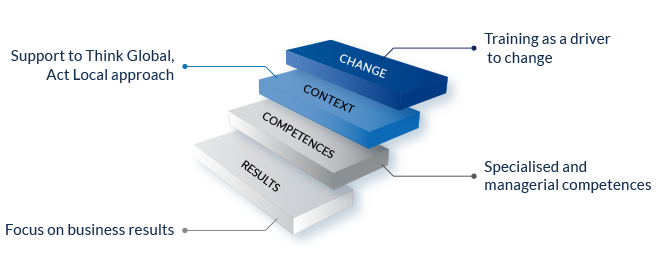Training
In-House Training
Training gives a boost to company organisation, providing support for change and efficient, effective corporate development. PRAXI is able to integrate its activities smoothly into the company’s vision, helping it achieve its business objectives with an approach to employee development that focuses closely on organisational impact.

Praxi Academy
Quality, experience and individual attention: this is PRAXI approach to learning.
Welcome to Praxi Academy, the Business Unit of Praxi Training and Development hat offers a catalogue of inter-company training options for Businesses, Professional Studios, Public Administration and the Healthcare sector.
Our faculty of consultants, with hundreds of organisational development projects carried out: this is the hallmark feature - and indeed the added value – of Praxi Academy. Our training team is completed with specialists in legal affairs, employment law and administrative law, ably assisted by actors, theatre directors and new media experts.
Our work groups are generally small, so as to guarantee an effective, efficient trainer/learner interaction. This is the only way to devote the proper amount of attention to each individual and the organisation s/he is part of, allowing everyone to go back to work feeling this break from their daily activities has been invested wisely and has allowed them to acqiure new or improved skills, perspectives and vision.

Individual and Group Coaching
Coaching is a training method closely in line with today’s need to accept uncertainty and implement swift, effective changes, thus sharpening personal resilience and change management skills.
Coaching is conducive to rapid, effective changes in a personal and professional context, tapping into latent individual and group potential. It is recognised worldwide as the most efficient, tailor-made route to fulfilling and maintaining individual potential and performance.
The main aim of our Coaching system is therefore to assist coachees in fulfilling their potential, focusing on the results they aspire to obtain and rendering them more effective and more efficient.
Based on the internationally consolidated methods acquired by our coaches through training and membership of the most prestigious international communities (ICF and WBCA), PRAXI has developed a range of different coaching processes designed to improve the individual performance of managers, high-potential figures and groups, offering executive coaching, skills coaching, team coaching and business coaching programmes.
Executive coachingDesigned to optimise performance, visibly improve efficacy and deal with change. Coaches and coachees work together to:
- assess existing skills and abilities
- clarify performance expectations
- align performance with the priorities and needs of the company
- identify and deal with changes.
Designed to develop and apply role-specific skills. Coaches and coachees work together to:
- assess existing skills and abilities
- plan improvements to them
- boost the efficacy of the action taken
- speed up learning.
Skills coaching methods are used to develop both management and technical/specialised skills (marketing, sales, economics, people development, …).
We have developed specific, significant experience in business coaching for sales people (store managers, key account managers, area managers, territory sales managers, national sales managers, …).
Team coachingTeam coaching is designed to improve the performance of groups working in-house or remotely. It aims to overcome cultural and professional differences by adopting a shared working approach geared towards a shared working objective.
The team coach supports the team in:
- analysing their efficacy levels, using tests or self-assessment methods
- analysing group dynamics
- discussing dynamics
- aligning their approaches to the goals established
- establishing a shared, effective working approach.
This method involves taking a real problem faced by the company and presenting it to the group so that the search for real solutions is placed right at the centre of the team development work. This real problem thus becomes the “playing field” on which teamworking skills are called upon to develop. In this way, the output delivered by the group can be directly applied to the specific company situation, as well as sharpening the relational, management and innovation skills of the players involved.
Business team coaching supports the team in:
- adopting a structured working method based on the Deming Cycle (PDCA: Plan, Do, Check, Act)
- taking account of targets and constraints associated with managing the innovation process
- management and goal orientation
- management and goal-orientation
- developing effective communication and presentations for internal clients.
Business Game
Few learning techniques are more effective than simulating real experience (learning by doing), and the challenge presented by the gamification of learning creates the ideal experiential and emotional conditions for guaranteeing faster acquisition of lasting skills.
In recent years, PRAXI has devoted close attention to sharpening the efficacy of the teaching methods adopted. In addition to designing educational games for large and small groups tailored to the specific needs of clients, PRAXI has come up with four teaching products designed to develop economic and financial , business development skills , management skills and motivation and empowerment skills).
Training Evaluation
When we plan and provide training, we commit to guaranteeing the client and the learners results that can be measured. The knock-on effects of training must be quantifiable in order to demonstrate the efficacy of the investment made for improving individual and company performance.
We have invested a great deal of effort in seeking and systematising effective teaching methods. This is why we are able to maximise the impact of learning during the time invested in training, as regards both developing skills and sharpening technical and professional abilities. Our experiments in this area have yielded outstanding results, also thanks to the professional relationships we have consolidated with the world of academia. Today we are strongly, systematically committed to developing training projects with measurable results.
PRAXI has designed an exclusive method for measuring results, based on the four-level evaluation model devised by Kirkpatrick (1977), using specific indicators to show the impact on corporate organisation and on individual skills.
As training professionals, internal clients and learners are all aware, careful, focused evaluation is instrumental to the future of effective training programmes.
